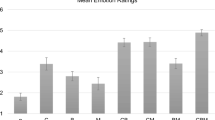Abstract
The influence of emotion on the false consensus effect was investigated. Participants were recruited from an undergraduate population. There were 210 participants (89 male) with a mean age of 19.25 years. The study took place online. Participants made a choice between two forms of vacation, and were induced to feel an emotion (happiness, neutral, or sadness). They were then asked to estimate the percentage of people who would opt for either the same choice as them or the alternate choice, and to make an attribution for this predicted behavior. Results revealed a false consensus effect (estimates of a vacation’s popularity were higher from participants who preferred that option than from participants who preferred the alternative option), an influence of emotion on consensus estimates (participants experiencing happiness made higher estimates of consensus than participants experiencing sadness), and an influence of emotion on attribution. Results were consistent with valence-based theoretical accounts of emotional influence.


Similar content being viewed by others
References
American Psychological Association. (2002). Ethical principles of psychologists and code of conduct. American Psychologist, 57, 1060–1073.
Asch, S. E. (1951). Effects of group pressure upon the modification and distortion of judgments. In H. Guetzkow (Ed.), Groups, leadership, and men. Pittsburgh: Carnegie Press.
Baumgardner, A. H., & Arkin, R. M. (1988). Affective state mediates causal attributions for success and failure. Motivation and Emotion, 12, 99–111.
Bower, G. H. (1981). Mood and memory. American Psychologist, 36, 129–148.
Brown, C. E. (1982). A false consensus bias in 1980 presidential preferences. Journal of Social Psychology, 118, 137–138.
Chambers, J. R. (2008). Explaining false uniqueness: Why we are both better and worse than others. Social and Personality Psychology Compass, 2, 878–994.
Coleman, M. D. (2011). Emotion and the self-serving bias. Current Psychology, 30, 345–354.
Coleman, M. D. (2013). Emotion and the ultimate attribution error. Current Psychology, 32, 71–81.
Forgas, J. P. (1998). On being happy and mistaken: mood effects on the fundamental attribution error. Journal of Personality and Social Psychology, 75, 318–331.
Forgas, J. P., & Bower, G. H. (1987). Mood effects on person perception judgments. Journal of Personality and Social Psychology, 53, 53–60.
Forgas, J. P., & Locke, J. (2005). Affective influences on causal inferences: the effects of mood on attributions for positive and negative interpersonal episodes. Cognition and Emotion, 19, 1071–1081.
Koestner, R., Losier, G. F., Worren, N. M., Baker, L., & Vallerand, R. J. (1995). False consensus effects for the 1992 Canadian referendum. Canadian Journal of Behavioural Science, 27, 214–225.
Lang, P. J., Bradley, M. M., & Cuthbert, B. N. (2008). International affective picture system (IAPS): affective ratings of pictures and instruction manual. Technical Report A-8. Gainesville: University of Florida.
Lerner, J. S., & Keltner, D. (2001). Fear, anger, and risk. Journal of Personality and Social Psychology, 81, 146–159.
Marks, G., & Miller, N. (1987). Ten years of research on the false consensus effect: an empirical and theoretical review. Psychological Bulletin, 102, 72–90.
Niedenthal, P. M., & Setterlund, M. B. (1994). Emotion congruence in perception. Personality and Social Psychology Bulletin, 20, 401–411.
Pronin, E., Lin, D., & Ross, L. (2002). The bias blind spot: perceptions of bias in self versus others. Personality and Social Psychology Bulletin, 28, 369–381.
Ramsey, S. R., Thompson, K. L., McKenzie, M., & Rosenbaum, A. (2016). Psychological research in the internet age: the quality of web-based data. Computers in Human Behavior, 58, 354–360.
Ross, L., Greene, D., & House, P. (1977). The “false consensus effect”: an egocentric bias in social perception and attribution process. Journal of Experimental Social Psychology, 13, 279–301.
Schwartz, N., & Clore, G. L. (1983). Mood, misattribution and judgments of well-being: informative and directive functions of affective states. Journal of Personality and Social Psychology, 45, 513–523.
Templer, K. J., & Lange, S. R. (2008). Internet testing: equivalence between proctored lab and unproctored field conditions. Computers in Human Behavior, 24, 1216–1228.
Tversky, A., & Kahneman, D. (1973). Availability: a heuristic for judging frequency and probability. Cognitive Psychology, 5, 207–232.
Uvacsek, M., Nepusz, T., Naughton, D. P., Mazanof, J., Ránky, M. Z., & Petróczi, A. (2011). Self-admitted behavior and perceived use of performance-enhancing vs psychoactive drugs among competitive athletes. Scandinavian Journal of Medicine & Science in Sports, 21, 224–234.
Walster, E. (1966). Assignment of responsibility for an accident. Journal of Personality and Social Psychology, 3, 73–79.
Wolfson, S. (2000). Students’ estimates of the prevalence of drug use: evidence for a false consensus effect. Psychology of Addictive Behaviors, 14, 295–298.
Author information
Authors and Affiliations
Corresponding author
Ethics declarations
Conflict of Interest
The author declares that he has no conflict of interest.
Rights and permissions
About this article
Cite this article
Coleman, M.D. Emotion and the False Consensus Effect. Curr Psychol 37, 58–64 (2018). https://doi.org/10.1007/s12144-016-9489-0
Published:
Issue Date:
DOI: https://doi.org/10.1007/s12144-016-9489-0




